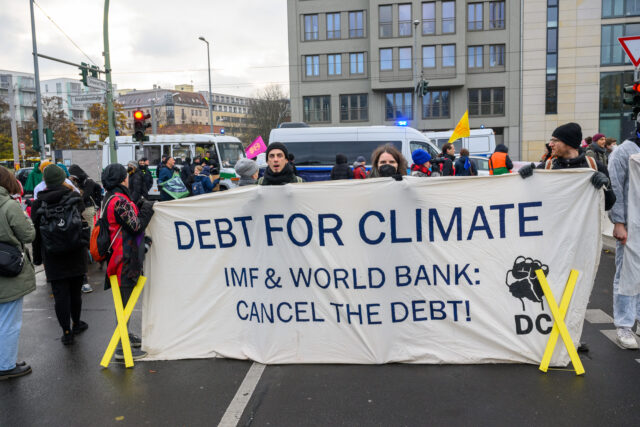“Debt justice is key to addressing the climate crisis,” claimed an organization posting on Facebook recently. By “debt justice,” they mean forgiving the loans that developing countries entered into willingly. One of the reasons they gave for why this is important is: “Debt is a major driver of climate change. Countries in debt distress are often forced to expand climate-destructive fossil fuel and industrial agriculture exports to repay their debts.”
Aside from the fact that there is no definitive proof that climate change is abnormal or that it is linked to a climate crisis, or that a climate crisis even exists, the entire argument is disturbing. First off, debt justice should mean that when a country borrows money, it pays it back. That would be justice.
The money loaned to developing countries ultimately comes from U.S. and other taxpayers. It did not come from the people now claiming the authority to forgive the loans. This is one of the many reasons President Trump cut off USAID and railed against globalist institutions. Despite claims to the contrary, the funding behind these loans is taxpayer-sourced across multiple channels:
The IMF insists it doesn’t rely on annual budget appropriations or direct taxpayer support. However, its primary funding comes from “member quotas,” capital subscriptions paid by countries based on their economic size. These quotas are funded by government revenues, which come from taxpayers.
The World Bank operates similarly. Its lending arm, the International Bank for Reconstruction and Development (IBRD), finances loans using both its own equity and capital raised by issuing World Bank bonds. Member countries also contribute capital subscriptions, again funded through national budgets, paid by taxpayers.
The Paris Club, a key venue for restructuring sovereign debt, manages official bilateral loans granted by governments or state-backed institutions. These government-to-government loans are financed directly by taxpayer-funded programs such as foreign aid and export credit.
Finally, U.S. foreign aid is funded through the federal budget, which is drawn from tax revenues. In fiscal year 2023, the U.S. spent $71.9 billion on foreign aid, roughly 1.2% of total federal spending. This is one of the programs President Trump slashed when he returned to office in 2025.
On the debt-climate connection The claim is that debt servicing creates perverse incentives, when countries face heavy debt burdens, they may prioritize short-term revenue sources like mining or cash crops over long-term environmental sustainability. But the link isn’t so simple. Environmental damage stems from many factors, governance failures and including corruption.
Often, countries borrow specifically to fund extractive or agricultural projects meant to generate income and yield returns. These polluting activities are the reason the debt exists. Canceling the debt wouldn’t change that. And those pushing for debt forgiveness aren’t proposing to shut down the mines or farms, nor are they offering alternatives to replace the lost income for the country or its people.
Those opposed to debt repayment often cite “predatory lending” as a reason the debt should be forgiven, but these countries borrowed willingly. They knew the terms when they took the loans and then failed to repay. The truth is, there’s no such thing as “predatory lending” in this context. Poor countries, like poor individuals, are charged higher interest rates due to a higher risk of default.
The very existence of a movement to “forgive” these loans proves the borrowers cannot repay, which means they were never creditworthy. That’s not predatory lending, it’s lenders accurately assessing the risk of default. And just like with individuals in the U.S., if the government were to step in and cap the interest rates that banks and credit card companies can charge poor people, those individuals would lose access to credit altogether.
Another spurious argument used by the debt forgiveness crowd is the “government continuity” claim, that current citizens shouldn’t have to repay loans taken by a previous administration they didn’t vote for. But while governments may change, countries as sovereign entities retain continuity of obligations. This principle is essential to international finance. If every new administration could disavow prior debts, no country could secure long-term development funding. By that logic, Americans could demand that only those who voted for Democratic-led foreign aid should have to fund it, while Republican voters could opt out.
The debt forgiveness movement wants the benefits of capital access without accepting the market mechanisms that make that access possible. It’s economically incoherent, and framing debt as the driver of climate crisis is fundamentally flawed.










